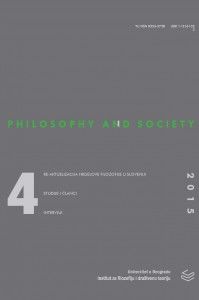Hegel’s Logic as the Exposition of God from the End of the World
Hegel’s Logic as the Exposition of God from the End of the World
Author(s): Jure SimonitiSubject(s): Philosophy, 19th Century Philosophy, German Idealism
Published by: Institut za filozofiju i društvenu teoriju
Keywords: Hegel; being; nothing; negation; intersubjectivity; public
Summary/Abstract: The article attempts to reconstruct the logical space within which, at the beginning of Hegel’s Logic, “being” and “nothing” are entitled to emerge and receive their names. In German Idealism, the concept of “being” is linked to the form of a proposition; Fichte grounds a new truth-value on the absolute thesis of the “thetical judgement”. And the article’s first thesis claims that Hegel couldn’t have placed “being” at the beginning of this great system, if the ground of its logical space had not been laid out by precisely those shifts of German Idealism that posited the ontological function of the judgement. At the same time, the abstract negation, the absence of a relation and sufficient reason between “being” and “nothing”, reveals a structure of an irreducibly dual beginning. The logical background of this original duality could be constituted by the invention of the “transcendental inter-subjectivity” in German Idealism, manifested, for instance, in Hegel’s life-and-death struggle of two self-consciousnesses. The second thesis therefore suggests that “being” and “nothing” are elements of the logical space, established in concreto in a social situation of (at least) two subjects one of whom poses an affirmative statement and the other negates it abstractly. From here, one could draw out the coordinates of a sphere by the name of “public” whose structure is defined by the invalidation of two basic laws of thought, the law of non-contradiction and the principle of sufficient reason. The article shows how only the statements capable of absorbing negation, of sustaining a co-existence of affirmation and its symmetrical, abstract negation, can climb the ladder of public perceptibility and social impact.
Journal: Filozofija i društvo
- Issue Year: 26/2015
- Issue No: 4
- Page Range: 852-874
- Page Count: 23
- Language: English

